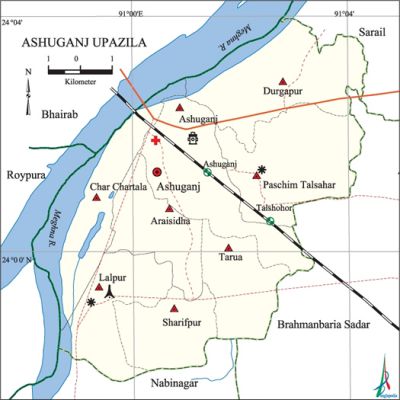Ashuganj Upazila
Ashuganj Upazila (brahmanbaria district) area 67.59 sq km, located in between 23°51' and 24°06' north latitudes and in between 90°53' and 91°19' east longitudes. It is bounded by sarail upazila of brahmanbaria district on the north, nabinagar upazila on the south, brahmanbaria sadar upazil on the east, bhairab upazila of kishoreganj district and raipura upazila of narsingdi district on the west. Ashuganj is called the daughter of the river meghna. It is a notable river port and industrial city of Bangladesh.
Population Total 180654; male 88340, female 92314; Muslim 172249, Hindu 8336, Buddhist 12, Christian 18 and others 39.
Water bodies Main river: Meghna.
Administration Ashuganj Thana was formed in 1984 and it was turned into an upazila on 25 July 2000.
| Upazila | ||||||||
| Municipality | Union | Mouza | Village | Population | Density (per sq km) | Literacy rate (%) | ||
| Urban | Rural | Urban | Rural | |||||
| - | 8 | 30 | 41 | 36749 | 143905 | 2673 | 54.6 | 50.3 |
| Upazila Town | ||||||||
|
Area (sq km) |
Mouza |
Population |
Density (per sq km) |
Literacy rate (%) | ||||
| 15.35 | 4 | 36749 | 2394 | 54.6 | ||||
| Union | ||||
| Name of union and GO code | Area (acre) | Population | Literacy rate (%) | |
| Male | Female | |||
| Araisidha 12 | 1469 | 9987 | 10740 | 54.2 |
| Ashuganj 14 | 2799 | 17435 | 17675 | 49.4 |
| Char Chartala 26 | 1572 | 13192 | 12597 | 55.0 |
| Tarua | 1603 | 4041 | 4708 | 55.0 |
| Durgapur 38 | 3038 | 17108 | 17640 | 50.5 |
| Paschim Talshahor 74 | 2813 | 11354 | 11957 | 47.1 |
| Lalpur 42 | 1818 | 8973 | 9702 | 50.4 |
| Sharifpur 77 | 1590 | 6250 | 7295 | 51.4 |
Source Bangladesh Population Census 2011, Bangladesh Bureau of Statistics.
Archaeological heritage and relic Ashuganj Tahsil Office (1904).
War of Liberation On 14 April 1971 freedom fighters Abul Hossain, Shahjahan, Lance Nayekk A. Hai, Subedar Sirajul Islam and Sepahi Abdur Rahman were killed in an encounter with Pak army. During the War of Liberation the Pak army used to torture and kill suspected Bangalis at a slaughter place near Ashuganj Silo. On 9 December 1971 the Pak army destroyed part of Ashuganj-Bhairab railway bridge on the Ashuganj side by dynamite. Assuming that the Pak army had left Ashuganj after destroying railway bridge, the allied forces advanced towards Ashuganj to occupy it. As soon as they reached within 50 yards of Asuganj Thermal Power Plant the Pak army launched heavy attacks on the 18 Rajputa Regiment and killed 70 members of the allied forces including 4 officers. The Pak army left Asuganj on 10 December 1971. There is a mass grave at Lalpur Bazar and a mass killing site at the Ashuganj silo area.
For details: see আশুগঞ্জ উপজেলা, বাংলাদেশ মুক্তিযুদ্ধ জ্ঞানকোষ (Encyclopedia of Bangladesh War of Liberation), বাংলাদেশ এশিয়াটিক সোসাইটি, ঢাকা ২০২০, খণ্ড ১।

Marks of War of Liberation Mass grave 1 (Lalpur Bazar); mass killing site 1 (Ashuganj silo).'
Religious institutions Mosque 205, temple 11, tomb 6.
Literacy and educational institutions Average literacy 51.2%, male 52.0%, female 50.4%. Educational institutions: 'college 4, secondary school 14, primary school 46, madrasa 4, orphanage 41. Noted educational institutions: Feroj Miah Degree College, Bangabandhu Technical College, Abbas Uddin Khan College, Zia Fertilizer Factory School and College, Asuganj AAI High School, Hazi Abdul Jalil High School, Lalpur S. K. Das Chowdhury High School, Tarua Girls' High School, Talshahor Karimia Senior Madrasa, Araisidha Senior Madrasa, Darul Huda Ebtedaiye Madrasa.
Cultural organisation Library 4, other cultural institutions' 6, theatre 2, press club 1.
Newspapers and periodicals Pratasha, weekly Meghna Chitra, Asuganj Sangbad, Ekushey Alo, Kalamer Katha.
Main sources of income Agriculture 27.88%, non-agricultural labourer 6.56%, industry 1.79%, commerce 23.55%, transport and communication 2.24%, service 14.10%, construction 2.02%, rent and remittance 3.57% and others 18.29%.
Ownership of agricultural land Landowner 53.04%, landless 46.96%; agricultural landowner: urban 49.53% and rural 53.99%.
Main crops Paddy, jute, mustard seed, potato, chilli and vegetables.
Extinct and nearly extinct crops China, linseed, koun and ground nut.
Fisheries, dairies and poultries This upazila has a number of fisheries, dairies and poultries.'
Communication facilities Roads: pucca road 47 km, semi-pucca road 12 km, mud road 163; railways 7 km; waterway 14 km; railway station 2.
Noted manufactories Asuganj Thermal Power Plant, Zia Fertilizer Factory, etc.
Hats, bazars and fairs Total number of hats, bazars and fairs are12, most noted of which are Asuganj Hat, Char Chartala Hat, Talshahor Hat, Tarua Hat and Lalpur Hat, Baishaki Mela (Asuganj), Talshahor Mela and Araisidha Mela.
Access to electricity All the unions of the upazila are under electricity net-work; however 91.2% dwelling households have access to electricity.
Sources of drinking water Tube-well 90.5%, tap 8.0%, and others 1.5%.
Sanitation 90.3% of dwelling households of the upazila use sanitary latrines and 7.8% of dwelling houses use non-sanitary latrines; 1.9% of households do not have latrine facilities.
Health centres Satellite clinic 1, clinic 3, family welfare centre 4.
NGO activities asa, proshika, Araisidha Nari Unnayan Kendra, Jagarani Kendra and Grameen Unnayan Kendra. [Muhibur Rahim]
References Bangladesh Population Census 2001 and 2011, Bangladesh Bureau of Statistics; Cultural Survey report of Ashuganj Upazila 2007.
